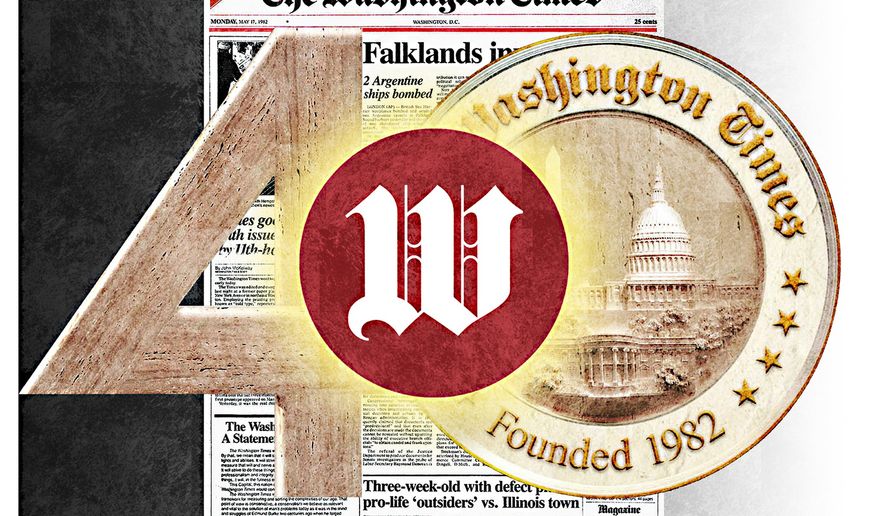OPINION:
On May 16, 1982, the media world was dominated by the editors and other gatekeepers at just a handful of major media organizations.
The New York Times routinely set the national agenda, the television networks built their news broadcasts around those stories, and other participants in the legacy media followed their lead. These gatekeepers, monochromatic in tone, temperament, beliefs, experience and education, were a pretty well-run conspiracy against the American public and a bulwark against any threat of a truly operational first amendment.
The next day, May 17, 1982, The Washington Times published its first edition and helped change all of that.
To those who came of age after the ubiquity of the internet and the absolute immediacy of communication, it is difficult to imagine how revolutionary, how transformative, how important The Washington Times was and is. For those of us who came of age in the 1970s and 1980s, however, it is easy to remember the thunderbolt that was the creation of The Washington Times.
For the first time in a generation, the information monopoly — dominated by New York print and television outlets — was challenged.
For the first time in a long time, there was a newspaper that was happy to celebrate America at a time when all the cool kids in the media were jaded at best and hostile at worst toward their native country.
For the first time, voices from across the spectrum of ideas and beliefs had a legitimate platform, a platform that enabled many who had been marginalized to be read, heard or seen by large numbers of their countrymen.
There were, of course, magazines and journals that were important as well, but they emphasized long-form essays and were the province of academics and policy wonks.
The Washington Times, however, was created and remains an actual broadsheet newspaper, engaging in delivering news and commentary each and every day. Its presence remains a standing daily counterpoint and challenge to the legacy media.
Writers as different as Pat Buchanan, Nat Hentoff, Ted Nugent and Charlie Hurt have graced its pages. Presidents, cabinet officials and members of Congress have all written for and appeared in The Washington Times. Throughout these 40 years, it has driven and continues to drive the needed and critical political and cultural discussions in our nation.
On May 17, 1982, there was no Rush Limbaugh or talk radio. There was no Fox. There was no Drudge. The great democratization of information brought about by the internet was still two decades away. On the long and bumpy road to the reform and renaissance of the media, especially political media, The Washington Times was the foundational and essential step.
The Washington Times has remained, across these 40 years, at the head of the effort. It has expanded the public discourse and continues to bring new and sometimes unsettling ideas to the public forum for consideration. Today, especially, the newspaper understands in its marrow the importance of a contrarian’s voice in a world where social media is so intent on enforcing a banal and corrosive orthodoxy.
Like all organizations, The Washington Times is the sum of the efforts of its employees, who work every day to bring important truths to light. As difficult as it is to remember sometimes, that’s what newspapers are supposed to do.
For my own part, I have wanted to write a column for the Times since I first started reading it way back in 1982. Like most of the folks who work at the paper, I am proud to have the chance to participate, in some small way, in its important work.
Here’s to 40 more years of being an important forum, a contrarian voice, a truth-teller, a challenge to the status quo and a leader.
• Michael McKenna, a columnist for The Washington Times, is the president of MWR Strategies. He was most recently a deputy assistant to the president and deputy director of the Office of Legislative Affairs at the White House.




Please read our comment policy before commenting.